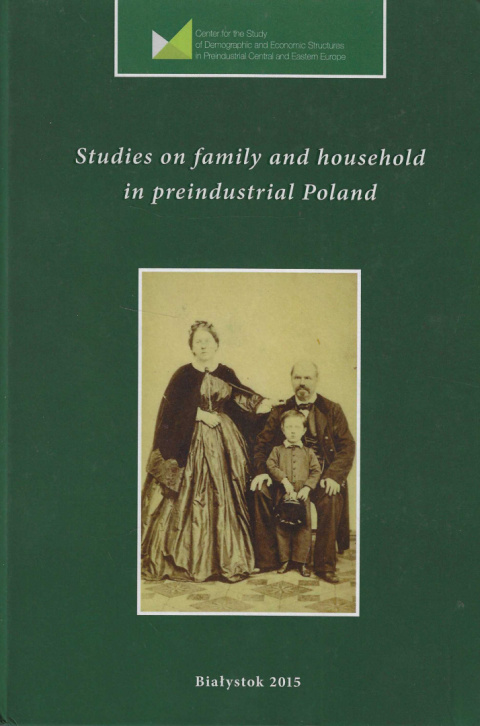-
Koszyk jest pusty
-
x

-
Koszyk jest pusty
-
x
- Kategorie
-
Studies of family and household in preindustrial Poland


| Wysyłka w ciągu | 24 godziny |
| Cena przesyłki | 11 |
| Dostępność |
Mała ilość
|
| Kod kreskowy | |
| ISBN | 9788364103490 |
| EAN | 9788364103490 |
| Zostaw telefon |
Redakcja: Piotr Guzowski, Cezary Kuklo
Rok wydania: 2015
Liczba stron: 256
Okładka: twarda
Format: 17,00 cm x 24,00 cm
Seria: Desertatuones 12
Uwagi - okładka z lekkimi zatarciami
It seems that family, understood as a unit consisting of parents and children, and sometimes also other close relatives living together in one household, Has been so common and natural since the dawn of our civilization that our knowledge of its origins, development (size, structure) and breakdown in the more and less distant past ought to be not only profound but also comprehensive. It remains obscure why this has not been so, especially that the institution of family in popular social consciousness was, at least until the Second World War, very highly regarded. According to recently deceased French historian, Jean-Louis Flandrin, our gaps of knowledge of the family’s past may be explained by the fact that writing the history of family life has been left in the hands of ethnologists, sociologists and lawyers.
(from preface)
Wydaje się, że rodzina, rozumiana jako jednostka składająca się z rodziców i dzieci, a czasem także innych bliskich krewnych żyjących razem w jednym gospodarstwie domowym, jest od zarania naszej cywilizacji tak powszechna i naturalna, że nasza wiedza o jej pochodzeniu, rozwoju (wielkość, struktura) i załamania w mniej i bardziej odległej przeszłości powinny być nie tylko głębokie, ale i wszechstronne. Niejasne pozostaje, dlaczego tak się nie stało, zwłaszcza że instytucja rodziny w powszechnej świadomości społecznej była, przynajmniej do II wojny światowej, bardzo wysoko ceniona. Według zmarłego niedawno francuskiego historyka Jeana-Louisa Flandrina nasze braki w wiedzy o przeszłości rodziny można tłumaczyć tym, że pisanie historii życia rodzinnego zostało pozostawione w rękach etnologów, socjologów i prawników.
(ze wstępu)
Spis treści:
Preface /7
Jan Tęgowski, The Polish dynastic family of the 10th-15thcenturies /11
Piotr Guzowski, Demographic representation of the late medieval noble family in the light of the latest genealogical research /39
Piotr Łozowski, Demography of the burgher family in Old Warsaw in the first half of the 15thcentury /57
Marzena Liedke, Procreative Attitudes of the Magnates of the Grand Duchy of Lithuania in the 16th-18thCenturies: Selected Issues /75
Iwona Kulesza-Woroniecka, Disintegration of the noble family elite in the 17th-18thcenturies /97
Cezary Kuklo, Marriage, children and family in Polish cities and towns in the 16th-18thcenturies /117
Radosław Poniat, The age of entering the service in Polish lands in the second half of the 18thcentury: In pursuit of life-cycle servants /145
Mikołaj Szołtysek, Age heaping and digit preference in eighteenth-century Poland-Lithuania: who was rounding off their age, and why? /163
Konrad Wnęk, Sociotopography of Cracow families at the end of the 18thcentury /197
Lidia A. Zyblikiewicz, The Cracow family in the times of Franz Josef /233
